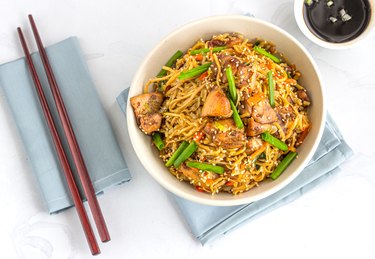Calories in a Beef Chow Main Takeaway

Chinese food can be a healthy option if you know what to look for on the menu.
Image Credit: Ravsky/iStock/GettyImages
Chow mein noodles prepared in light oil with lots of vegetables and lean protein is a great option that's low in calories and high in nutrients.
What Is Chow Mein?
Chow mein is a Chinese dish made up of stir-fried noodles with Asian vegetables. Depending on what a chef decides to do with those guidelines can make or break chow mein as a healthy option. And when you buy an overly processed chow mein, it can have lots of calories and very few fresh vegetables.
The popular chain Panda Express uses chow mein noodles made from wheat flour and stir-fries them with onions, celery and cabbage. A 9.4-ounce serving of Panda Express chow mein has a little over 500 calories. The dish has 20 grams of fat, 80 grams of carbohydrates and 13 grams of protein.
You can also buy instant chow mein produced by Nissin Foods from the grocery store. This product line includes dehydrated chow mein noodles made from wheat flour along with dehydrated vegetables and protein sources. A quick skim of the ingredient list shows that these packaged products are made primarily from wheat flour, vegetable oil, salt and sugar — not the healthiest option.
According to the USDA, a package of Nissin Foods' chow mein noodles has about 560 calories, with 10 grams of protein, 28 grams of fat and 66 grams of carbohydrates.
Chow Mein Calories and Nutrition
With their calorie density and low number of vegetables, some chow mein options don't look nutritionally sound. Your better choice is to make chow mein at home, which gives you control over the chow mein noodles you choose and the lean protein you include (for example, you could make chicken chow mein, beef chow mein, shrimp chow mein or even tofu chow mein).
According to a recipe from USDA What's Cooking?, you can use chow mein noodles made from rice flour, although egg noodles made from wheat will also suffice if that's your preference. As Mayo Clinic points out, rice flour is an ideal option for people who are unable to eat gluten.
The directions guide you to sauté your noodles lightly in oil with a variety of vegetables that will provide a dose of healthy vitamins and minerals. This will help keep your chow mein calories low and your nutrient density high. This recipe calls for:
- Carrots: a source of vitamins A, E and K
- Broccoli: a source of calcium, potassium, magnesium and vitamins C, E and K
- Celery: a source of potassium and vitamin K
- Bell pepper: a source of vitamins C, A and E
From a nutritional perspective, you should be careful with the soy sauce. Although it won't boost the chow mein calories too much — it has only 8 per tablespoon — it does have a lot of sodium at 880 milligrams, about 37 percent of your daily value.
Another recipe, this one from the Produce for Better Health Foundation, calls for low-sodium soy sauce and encourages sauteing the chow mein with vegetable spray instead of oil, which lowers the overall fat content.
If you're looking to improve the nutritional profile of your chow mein even more, add some lean protein. Making your veggie chow mein into chicken chow mein is as easy as adding lean chicken breast to the stir fry. Chicken chow mein made with a 3-ounce chicken breast would have an additional 133 calories with 27 grams of protein.
If you love Chinese cuisine, especially when it combines noodles and vegetables, there are other fun culinary experiments you can try at home, such as spicy Asian carrot "noodles."
Source: https://www.livestrong.com/article/518105-nutrition-facts-of-chow-mein/
0 Response to "Calories in a Beef Chow Main Takeaway"
Post a Comment